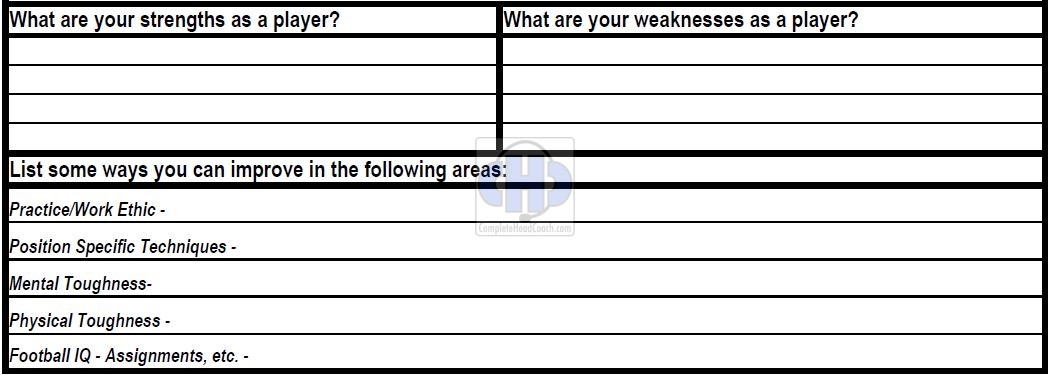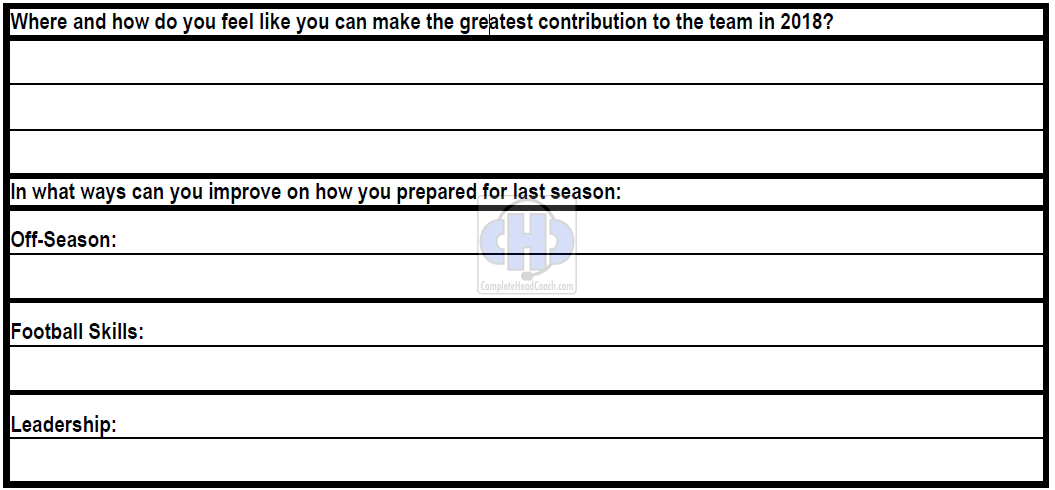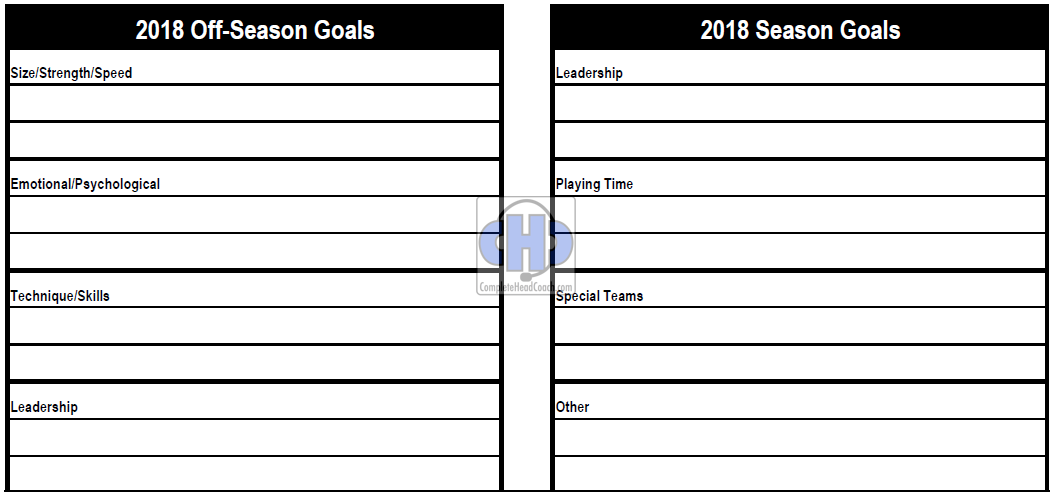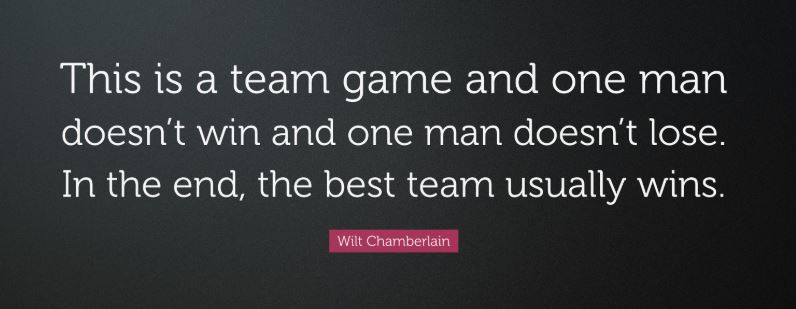

Unless you finish the season with a win in the State Championship game, the season will always end too soon. With the end of the season comes equipment turn-in, banquet planning, off-season workout planning, coach evaluations as well as some much-needed time with the family. One of the most valuable things we do with our team is an end of the season player review. This used to be a front to back, paper and pencil questionnairethat went through the season review, leadership review, Off-season goal setting and goal setting and expectations for the next year. This process became tedious, reminding kids to turn it in, making more copies because they lost the original, or sometimes just never getting them turned in at all. This year, I created a google form with all of the same questions, shared the link with the team, and within 2 hours, 25 of our 40 returning players had already submitted. Google forms are extremely easy to create, kids can fill the form out on their phones, and tabulating results is done automatically.
Enough about the how, I will now get to the why. I have found, there is no better way to get the pulse of our team and our program than by having the kids fill out these season review sheets. In the first part, we ask kids for basic information like name, emails, will they be playing other sports, etc. These questions allow us to get updated phone numbers, email addresses, heights, weights, and other valuable information.
The second portion involves questions about the player's experience as a football player this year. The question are things like:
On a scale of 1-10 or 1-5, how would you rate your football experience this year?
What is your likelihood of playing football next fall?
How much do you enjoy the company of your teammates?
List a few things you enjoyed most about playing football this year.
List a few things you did not enjoy about playing football this year.

These questions allow you to get a pulse on what each individual player is thinking about playing football. Specifically, the question about whether or not a kid will play football next year. We never want to lose a player on our team regardless of talent level because they had a bad experience. This gives us an opportunity to talk with that player and dig a little deeper into why that kid is considering not returning to the team. The answers to these questions also give you as a coach, the opportunity to fix the things that gave the kid a bad experience, while continuing to do the things that gave the player a good experience. Interestingly enough, I have found that playing time is rarely the reason for a kid having a good or bad experience. In addition, if you find that a common theme continues to arise in the player's answers, you have a definite problem that you need to address. We have found that our players are our greatest recruiters, so it is extremely important that they love being part of the team. That way, they will talk to kids in the school that do not play football and convince them to come play football. Word of mouth about a great experience is the best way to add kids and grow your program. A great experience is also the best way to retain the players that you have.
The next section focuses on player strengths, weaknesses and ways to improve in certain areas. This section forces the player to become self-aware of what they do well and what they need to work on to be the best player they can be. The first step in knowing how to improve at anything is realizing what your strengths and weaknesses. I really appreciate the honesty and self-awareness some players show in this section. It is also interesting to see what some players think of themselves as a player compared to what the coaching staff thinks of them as a player. Some players are definitely more self-aware than other players are when recognizing their own strengths and weaknesses. This portion is extremely relevant to helping each player become the best player they can be.

The leadership section asks the players to rate themselves as a leader and define their own leadership style. This allows you to see what players think of their own leadership styles so you can tap into their skills when leading the team into the next year. We also ask this question:
This question helps us build a leadership team with players from each class to help guide us in making decisions for the team. It also gives us a glimpse of who kids believe will lead them when the going gets tough. The kids named the most in this question are the kids we begin to rely on the most to get the pulse of our team and lead the way.

The next section asks players the following questions:

We ask our players to accept their role on the team each year, but always work to increase their role and never be fully happy with their role until they are starting and playing the position they want to play the most. We all know that does not happen for every kid, but we always want them to work to achieve the role they aspire to have. It is also important for the coaches to understand where the player sees himself contributing to the team’s success. This information gives the coach time to help the kid achieve that role, or time to see that a position change may be in the best interests of the player to achieve the most amount of playing time. This section also prompts players to evaluate the three areas of preparation in off-season training, football skills and leadership, so they can make the proper adaptations that will allow them the most success during the season.

Finally, we ask the players to set off-season goals and goals for the next season. Goal setting is extremely important in any program. Specific to our program, we coaches want to know what the player’s goals are so that we can help him achieve the success he desires. Along the same lines, sometimes the off-season can be a drag and we can use the player’s personal goals to get them focused on achieving their goals. Also, by narrowing the focus into areas, players are able to differentiate their goals and think about all areas of being a well-rounded player and member of the team.

This section gives the players a chance to tell us anything that is on their minds. These comments are wide ranging and often very important gauging how the players feel.

Overall, having players review the season can be very beneficial for program. These reviews allow the coaching staff to get ahead of any potential issues and can be enlightening. It gives coaches the information they need to build a strong, positive culture within your program. The best “TEAM” always wins and the best teams normally have the best cultures.
Graduating Seniors are a special group that can give you a unique perspective on the program. Because they are leaving, they will tell you things that they may not have told you while still playing. Because of this, we ask them the experience portion, but we also ask them some questions unique to them. Some examples are:
I am always grateful for our senior players. We try our best to give those guys opportunities even if they don't start or even play very much. Because of this, I love hearing from them the things they enjoyed and didn't enjoy. Senior players are honest, forthcoming and want the program to succeed.
In the end, the players in our program will stand on the shoulders of the young men that played before them. A great playing experience and program culture allows that to happen with great success.